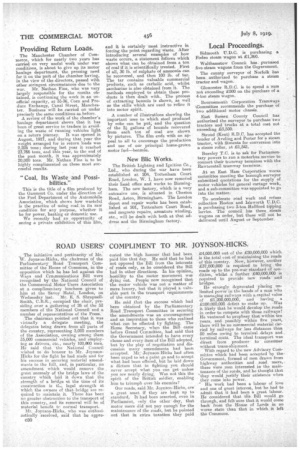ROAD USERS' COMPLIMENT TO MR. JOYNSON-HICKS.
Page 8

If you've noticed an error in this article please click here to report it so we can fix it.
The initiative and pertinacity of Mr. W. joynson-Hicks, the chairman of the Parliamentary Road Transport. Cornmittee of the House of Commons, in the opposition which he has led against the Ways and Ccricmunications Bill were recognized by the National Council of the Commercial Motor Users Association at a complimentary luncheon given to him at the Savoy Hotel, London, on Wednesday last. Mr. E. S. ShrapnellSmith, C.B.E., occupied the chair, presiding over a gathering of 26 of the 52 members of the National Council and a number of representatives of the Press.
The chairman pointed out that it was virtually a delegate meeting, the delegates being drawn from all parts of the country, representing 3,000 members of the Association, owning among them 35,000 commercial vehicles, and employing as drivers, etc., nearly 100,090 men. He said that •the National Council wished to do honour to Mr. JoynsoriHicks for the fight he had made and for his success in securing material amendments to the Bill, and, in particular, an amendment which would remove the great anomaly of the bridge laws of the country which laid it down that the strength of a bridge at the time of its construction is tL legal strength at which the owners of that -bridge are required to maintain it. There has been no greater obstruction to the transport of this country,. and its -removal will be of material benefit tc, normal transport.
Mr. Joynson-Hicks, who was enthusiastically received, said that he anpre 030 ciated the high honour that had been paid him that day. He said that he had not opposed the Bill from the interests of roads only, as he considered the Bill bad in other direction. In his opinion., hostility to the motor movement was dying out. People now recognized that, the motor vehicle was not a. matter of mere luxury, but that it played a valuable part in the transport requirements of the country.
He said that the success which had been obtained by the Parliamentary Road .Transport Committee in securing the amendments was an encouragement and an inspiration to those who realized what can be effected Ey fighting. The Home Secretary, when the Bill came before Grand Ccmanittee, had said that the Government intended to have every clause and every item of the Bill adopted, but by the play of negotiation and discussion many amendments had been accepted. Mr: Joynson-Hicks had often been urged to let a point go and to accept what had been offered, but he laid down a dictum that in fighting you should never accept what you can get • unless you are nearly dying. Wile not this the spirit of the British soldier, enabling him to triumph over his enemies?
Our roads, said Mr. Joyntoti-Hicks, are • a great asset if they are kept op to standard. It had been asserted, even in Parliament, tally the other day, that motor users did not pay enough for the maintenance of the roads, but he pointed out that in extra taxation they paid £4,000,000 out of the £20,000,000 which. is the total cost of maintaining the roads of this country. Now, hOwever, another £37,090,000 is required to bring the roads up to the pre-wax standard of con,dition, whilst a further £40,000,000 is required to provide new roads and bridges. He strongly deprecated placing unlimited power in the hands of a man who is managing railways with a capital value' of £1,200,000,000, and having a £100,000,000 deficit to make up. -Was it likely that he would develop the roads in order to compete with those railways? He ventured to prophesy that within ten years, and possibly within five years, there will be no commercial material carried by railways for less distances than 59 miles owing to terminal delays and terniinal costs. The ideal transport was direct from producer to consumer without trans-shipment. With regard to the new Advisory Committee which had been accepted by the' Government, formed of men drawn from highway authorities and road users, . these were men interested in the maidtenance of the roads, and he thought that 'they would justify their existence when they come into power. His work had been a labour of love and one of great interest, but he had to admit that it had been a great labour. He considered that the Bill would go through, and felt sure that it would come back from the House of Lords in no worse state than that in which it left the Commons.






















